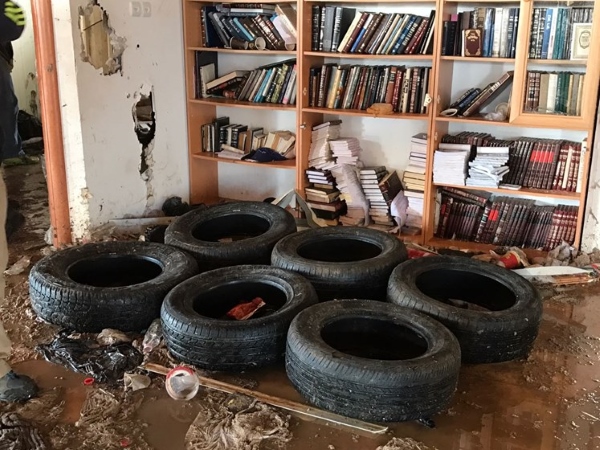Trump’s recent interview with Israel Hayom has got a lot of people upset. Waffling on moving the embassy? Settlements are “not a good thing for peace?” A deal with the Palestinians “can be made and should be made?” Where is the Trump that promised to move the embassy on his first day in office? Where is the one who said that settlements are not an obstacle to peace?
Calm down.
What Americans don’t understand, and what I am surprised that many Israelis have been slow to realize, is one simple fact about Trump: he is a Middle Eastern leader.
He is not a Dwight Eisenhower or a Harry Truman or even a Barack Obama. Although born in New York, he operates like a son of Cairo or Baghdad. This can be a bad thing or a good thing, depending on who you are and what you want from the American president.
Americans are upset that Trump has a tendency to stretch or even totally invert the truth. “He’s a liar, they shout.” Nonsense. He simply has a Middle Eastern theory of truth. There is no standard of objective reality in the Middle East; truth is what comports with the narrative. So Mahmoud Abbas and friends say and believe that there was no Jewish Temple in Jerusalem and that the “Palestinian people” are descended from the ancient Canaanites, and Jesus was a “Palestinian.” Things like historicity are Western ideas that don’t fly in the Middle East. Many Americans strongly support the Palestinian cause despite this. So why do they have so much trouble with Trump?
Trump’s declarations of his intentions often become, to use a Nixonian phrase, “inoperative.” Yes, he promised to do xyz but instead he does abc. And then he says “that’s what I said I was going to do all along.” Americans sputter and fume, but that is because they don’t understand that in the Middle East, a statement of intention is made only for its immediate effect. A promise is more an expression of the leader’s mood, feelings and desires, and an attempt to influence his listeners (although Middle Easterners understand this and are only slightly affected) than what a Westerner calls a “promise.” No obligation is incurred, and everyone knows it.
Trump’s remarks about Israel are aimed at various targets — in the US, in Israel and in the Arab world. Words in the Middle East are not primarily descriptions of facts or intentions. Words are tools or even weapons. There is a simple rule for understanding Middle Easterners: don’t look at what they say, look at what they do.
Benjamin Netanyahu has met with many Middle Eastern leaders and understands this. I expect that his meeting with Trump this week will be fruitful. Netanyahu will try to get a sense of what Trump actually wants and how he will act, and he will convey Israel’s priorities (Iran, Iran and Iran) to him.
Now I want to turn to America.
Americans should keep some things in mind. First, what I said above about interpreting Trump’s statements. Try to discern the narrative. How does he see himself and how does he see the US and its place in the world? The narrative will provide clues as to what he intends to do. And pay closer attention to his actions than to his words. What orders does he issue? Whom does he appoint?
Middle Eastern leaders tend to disrespect democracy, and fairness is not their highest value. What can I tell you? This will be hard for Americans, who see themselves and their nation as striving to be democratic and fair. But America hasn’t been these things for some time. Some of the appeal of Trump may be that he recognizes this and doesn’t pretend to be something that he’s not. In my opinion, American society and politics are in a bad place, and more politically correct pretense, such as was provided by Obama, will not help pull it out. Maybe Trump will provide the necessary shock therapy (or maybe not – maybe it’s too late, or maybe he will employ the wrong medicine). The jury is still out.
Trump will try to release the constraints on the presidency as much as possible in order to be able to push his agenda. Obama did likewise – for example, the Iran deal – but different people complained. This is a trend, and Trump didn’t start it.
There are great external threats facing the country, from the Islamic world – both Iran and the Muslim Brotherhood – not to mention the resurgence of Russian expansionism. Foreign policy is often the weak spot of American presidents, and Trump is no less ignorant than most. I hope he will be advised by those who do understand the dangers.
Americans will also have to understand that Middle Eastern leaders expect to enrich themselves by their positions. The Clintons and Obamas have done quite well and Trump won’t play second fiddle. He may be a little more obvious about it (although it will take a lot to out-obvious the Clintons), but as long as he does not establish a kleptocracy – unfortunately all too common in the Middle East – America can afford it.
Middle Eastern leaders know who their enemies are and how to deal with them (Obama was quite Middle Eastern in this regard – “we’re gonna punish our enemies” he once said, referring to political opponents). I think we can expect the same or more from Trump.
So, here are a few words for Trump’s enemies (oops, “opponents”): it looks to me as though you are trying to confront him directly, from the ideological position of the progressive Left. If you do this, he will crush you. Great segments of America don’t care for progressive leftist ideology. They don’t believe that Muslims in America are discriminated against, and if they are, they deserve it. They don’t think America needs more people from Iran, Iraq, Syria, Somalia, Libya, Sudan or Yemen (if you ask, they would probably want to add countries to the list). They don’t think the worst thing about 9/11 is that it encouraged “Islamophobia.” They don’t think trans people deserve any special accommodations. They think gays should shut up about their issues. In confrontations between police and minorities they instinctively support the police.
In short, they are entirely on the opposite side from you about the issues that excite campus demonstrations – and Trump is their guy. He will have the support of the masses and you won’t. He is not going to give you any breaks. It isn’t al-Sisi vs. the Muslim Brotherhood (yet), but don’t push him. If you want to defeat him, you have to come up with a better narrative. You don’t have one, at least not yet.
America was a democratic republic; it had a government that (sometimes) held the country together and sometimes didn’t. It faced serious challenges and overcame them, or at least survived them. America is still there, in one piece, after the Civil War. That’s astonishing. It defeated Japan and helped defeat Germany in WWII. It underwent a remarkable flowering of the middle classes in the 1950s through the 60s, and major improvements in its treatment of its black minority in the 60s. Many people believed that social, economic and technological progress would only continue. Clearly that was only true for technology.
Now I think things are moving into a new phase, and America’s Middle Eastern president, Donald Trump, is more a symptom than a cause. It’s a new millennium, both literally and figuratively. I can’t predict whether it will be better or worse, but it will definitely be different.


 — From a 1981 RAND Corporation report on “
— From a 1981 RAND Corporation report on “